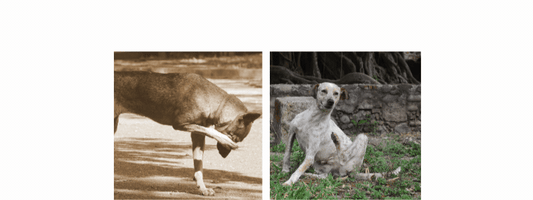
Senior Dog Nutrition!
Share
Title: The Essential Role of Protein and Natural Fat in Senior Dog Nutrition
As our canine companions age, their nutritional needs evolve, emphasizing the critical importance of providing adequate protein and natural fats in their diet. Contrary to misconceptions, senior dogs should not have their protein intake replaced with carbohydrates. Dogs, by nature, are carnivores, and prioritizing meat-based protein and healthy fats becomes paramount in ensuring their overall health and well-being, particularly in facilitating muscle repair and joint lubrication.
Protein serves as the building block for cells, tissues, and organs in a dog's body. In senior dogs, maintaining optimal protein intake becomes even more crucial as they experience natural muscle mass loss and reduced metabolic rates. Adequate protein levels support muscle maintenance and repair, helping senior dogs maintain strength, mobility, and overall vitality.
Additionally, senior dogs benefit significantly from the inclusion of natural fats in their diet. Healthy fats, such as those found in quality animal sources like fatty fish and lean meats, play a vital role in joint health and mobility. They provide essential fatty acids like omega-3 and omega-6, which possess anti-inflammatory properties, aiding in reducing joint inflammation and promoting joint lubrication. This is particularly beneficial for senior dogs experiencing arthritis or other age-related joint issues, enhancing their comfort and mobility.
Furthermore, natural fats contribute to overall skin and coat health in senior dogs. A diet rich in healthy fats helps maintain skin elasticity, promotes a shiny coat, and reduces the risk of dryness and irritation, common concerns in aging dogs.
It is crucial for pet owners and caregivers to prioritize high-quality protein and natural fats in their senior dog's diet. When choosing commercial dog food or preparing homemade meals, opt for formulas or ingredients that prioritize animal-based proteins like chicken, beef, fish, and eggs. These protein sources are not only rich in essential amino acids but also highly digestible, ensuring optimal nutrient absorption for senior dogs.
Incorporating natural fats can be achieved through the inclusion of ingredients like salmon oil, flaxseed oil, or coconut oil in their meals. These sources provide essential fatty acids, vitamins, and minerals that support overall health and well-being.
While carbohydrates can provide energy, they should not replace protein and natural fats in a senior dog's diet. Excessive carbohydrates can lead to weight gain and potential health issues, such as diabetes and inflammation, particularly in older dogs with reduced activity levels.
I have to stress again, most people think that senior dogs cannot consume too much protein and fat, which is a fallacy. While their metabolism may have slowed, protein and fats remain essential for senior dogs, reflecting their carnivorous nature. The key lies in adjusting the amount of their daily meal intake to accommodate their reduced metabolic rate, rather than reducing the protein and fats.
Regular veterinary check-ups are essential for senior dogs to assess their nutritional needs, monitor weight, and address any age-related health concerns. A veterinarian can provide personalized dietary recommendations based on a senior dog's age, breed, activity level, and health status.
In conclusion, protein and natural fats play pivotal roles in supporting the health, vitality, and longevity of senior dogs. Pet owners should prioritize high-quality, meat-based protein sources and incorporate natural fats into their senior dog's diet to promote muscle maintenance, joint health, skin and coat wellness, and overall well-being. By focusing on these essential nutrients, pet parents can ensure their senior dogs enjoy a fulfilling and comfortable life as they age gracefully.
As our canine companions age, their nutritional needs evolve, emphasizing the critical importance of providing adequate protein and natural fats in their diet. Contrary to misconceptions, senior dogs should not have their protein intake replaced with carbohydrates. Dogs, by nature, are carnivores, and prioritizing meat-based protein and healthy fats becomes paramount in ensuring their overall health and well-being, particularly in facilitating muscle repair and joint lubrication.
Protein serves as the building block for cells, tissues, and organs in a dog's body. In senior dogs, maintaining optimal protein intake becomes even more crucial as they experience natural muscle mass loss and reduced metabolic rates. Adequate protein levels support muscle maintenance and repair, helping senior dogs maintain strength, mobility, and overall vitality.
Additionally, senior dogs benefit significantly from the inclusion of natural fats in their diet. Healthy fats, such as those found in quality animal sources like fatty fish and lean meats, play a vital role in joint health and mobility. They provide essential fatty acids like omega-3 and omega-6, which possess anti-inflammatory properties, aiding in reducing joint inflammation and promoting joint lubrication. This is particularly beneficial for senior dogs experiencing arthritis or other age-related joint issues, enhancing their comfort and mobility.
Furthermore, natural fats contribute to overall skin and coat health in senior dogs. A diet rich in healthy fats helps maintain skin elasticity, promotes a shiny coat, and reduces the risk of dryness and irritation, common concerns in aging dogs.
It is crucial for pet owners and caregivers to prioritize high-quality protein and natural fats in their senior dog's diet. When choosing commercial dog food or preparing homemade meals, opt for formulas or ingredients that prioritize animal-based proteins like chicken, beef, fish, and eggs. These protein sources are not only rich in essential amino acids but also highly digestible, ensuring optimal nutrient absorption for senior dogs.
Incorporating natural fats can be achieved through the inclusion of ingredients like salmon oil, flaxseed oil, or coconut oil in their meals. These sources provide essential fatty acids, vitamins, and minerals that support overall health and well-being.
While carbohydrates can provide energy, they should not replace protein and natural fats in a senior dog's diet. Excessive carbohydrates can lead to weight gain and potential health issues, such as diabetes and inflammation, particularly in older dogs with reduced activity levels.
I have to stress again, most people think that senior dogs cannot consume too much protein and fat, which is a fallacy. While their metabolism may have slowed, protein and fats remain essential for senior dogs, reflecting their carnivorous nature. The key lies in adjusting the amount of their daily meal intake to accommodate their reduced metabolic rate, rather than reducing the protein and fats.
Regular veterinary check-ups are essential for senior dogs to assess their nutritional needs, monitor weight, and address any age-related health concerns. A veterinarian can provide personalized dietary recommendations based on a senior dog's age, breed, activity level, and health status.
In conclusion, protein and natural fats play pivotal roles in supporting the health, vitality, and longevity of senior dogs. Pet owners should prioritize high-quality, meat-based protein sources and incorporate natural fats into their senior dog's diet to promote muscle maintenance, joint health, skin and coat wellness, and overall well-being. By focusing on these essential nutrients, pet parents can ensure their senior dogs enjoy a fulfilling and comfortable life as they age gracefully.



